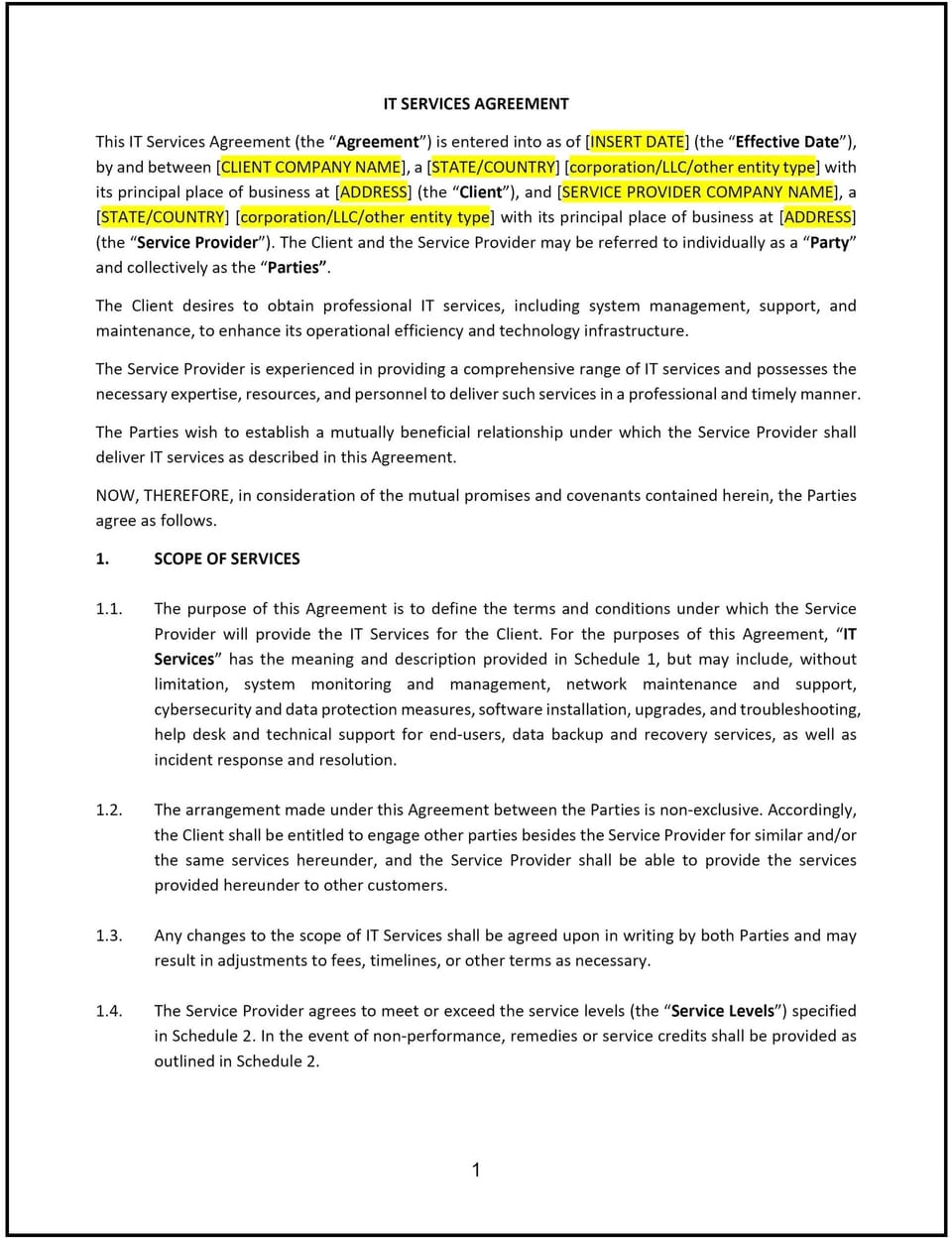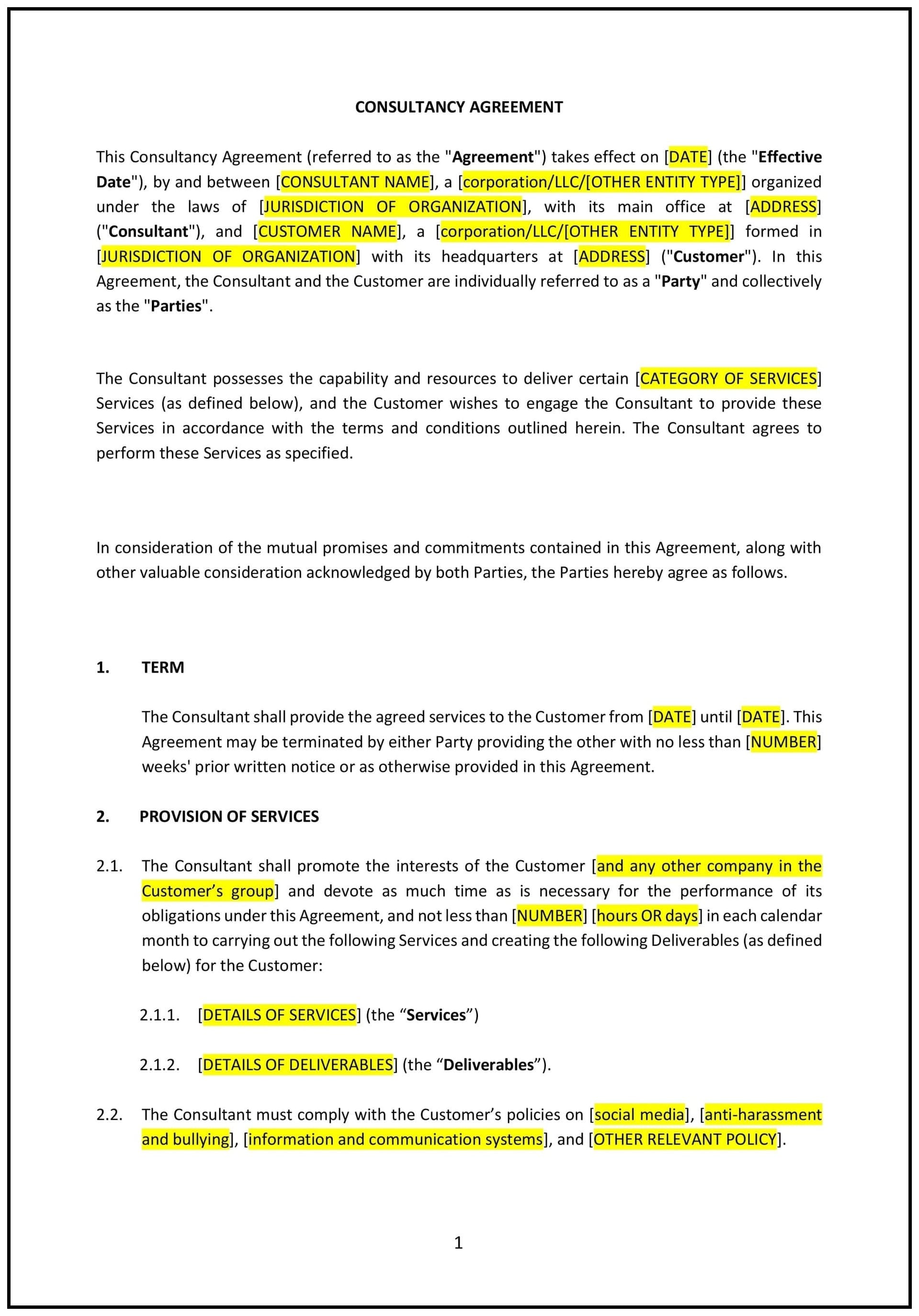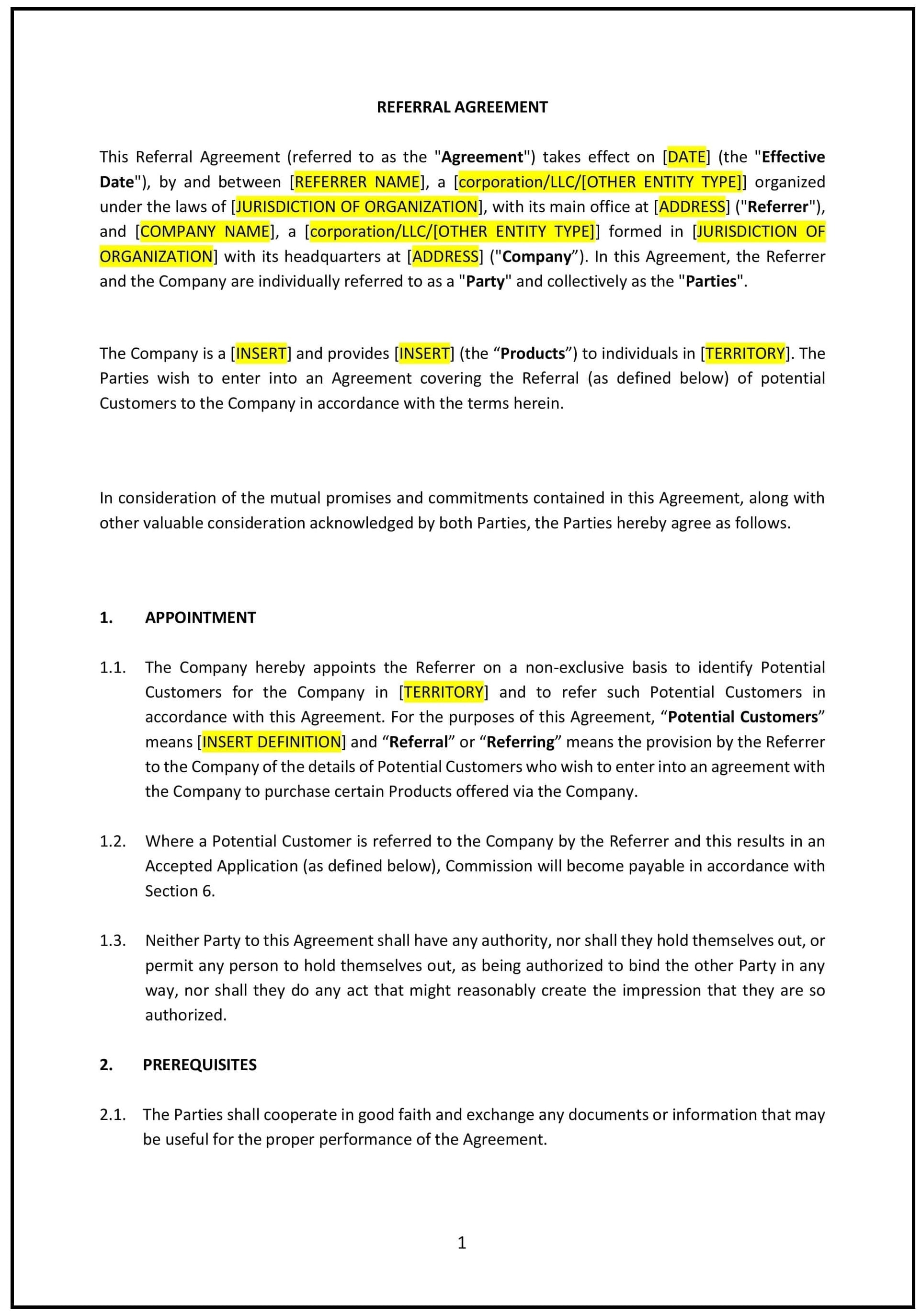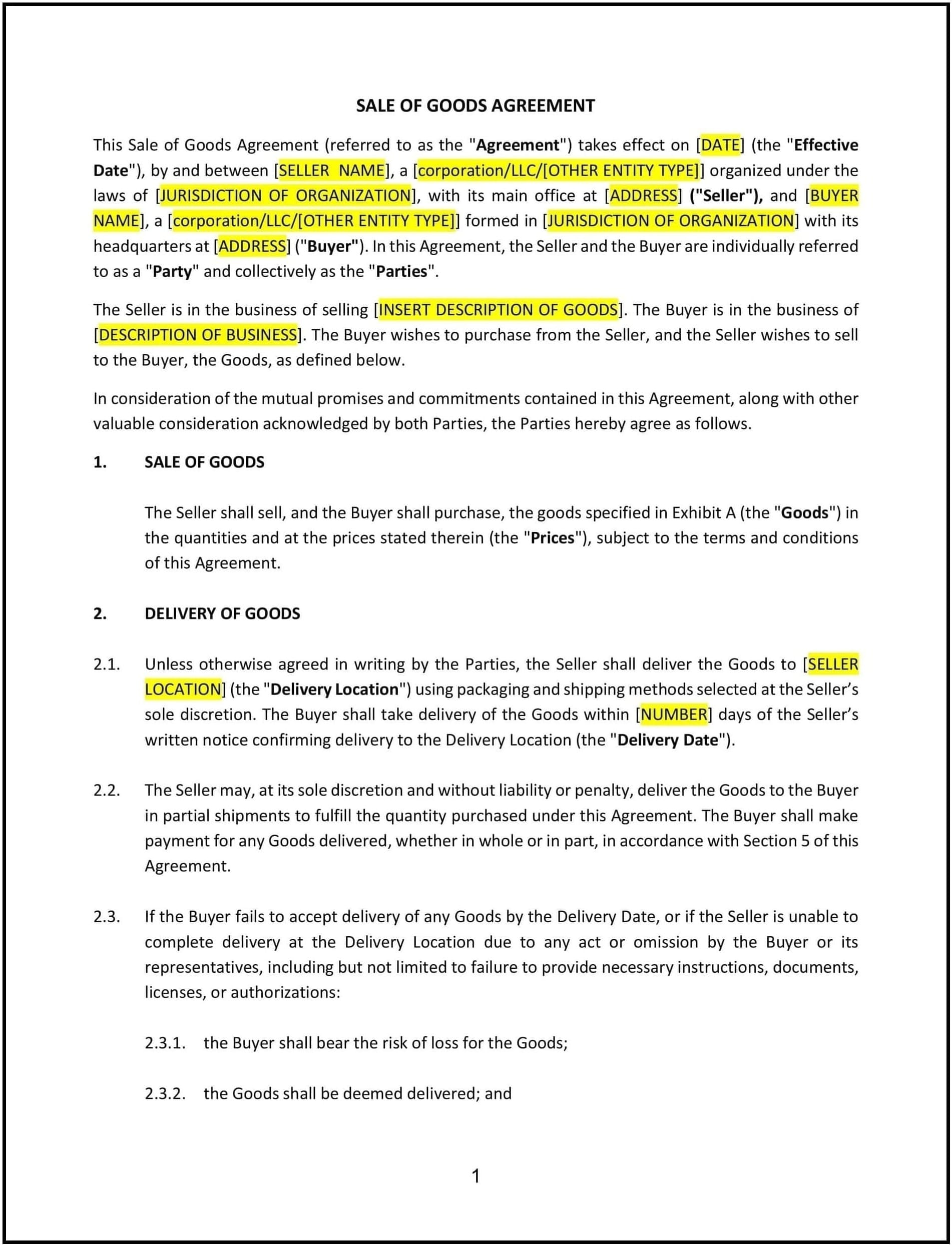IT Services Agreement (Alaska): Free template

IT Services Agreement (Alaska)
An IT Services Agreement is a contract that defines the relationship between an IT service provider and a client, detailing the services to be provided, payment terms, and performance expectations. In Alaska, these agreements are essential for businesses in industries like energy, tourism, and healthcare, where IT systems play a vital role in daily operations.
Alaska’s legal framework, including the Alaska Uniform Commercial Code (UCC) and consumer protection laws, ensures that IT Services Agreements are enforceable when properly drafted. For instance, an Anchorage-based energy company might use an IT Services Agreement to outsource its data management needs, ensuring compliance with state-specific regulations and industry standards. Alaska’s remote location and unique business environment make IT Services Agreements particularly important for businesses operating in the state.
Tips for drafting and maintaining an IT Services Agreement in Alaska
- Define the scope of services: Clearly outline the IT services to be provided, such as software development, network management, or technical support. Be specific about deliverables, timelines, and any exclusions.
- Example: “The Provider agrees to deliver monthly network maintenance, 24/7 technical support, and quarterly system updates for the Client’s operations.”
- Include payment terms: Specify the payment structure, whether hourly, fixed-fee, or project-based, and include invoicing and payment deadlines. Alaska law requires clarity in payment terms to avoid disputes.
- Example: “The Client agrees to pay the Provider $150 per hour for services rendered, with invoices due within 30 days of receipt. Late payments will incur a 1.5% monthly interest fee.”
- Address data privacy and security: Ensure the agreement complies with Alaska’s data protection laws and includes provisions for safeguarding sensitive information.
- Example: “The Provider agrees to implement industry-standard security measures, including encryption and multi-factor authentication, to protect the Client’s data from unauthorized access.”
- Set performance metrics: Define measurable goals, such as system uptime or response times, to ensure the Provider meets the Client’s expectations. Include penalties or remedies for failing to meet these metrics.
- Example: “The Provider guarantees 99.9% system uptime and a maximum response time of two hours for critical issues. Failure to meet these standards may result in a 10% discount on the monthly service fee.”
- Include termination clauses: Specify the conditions under which either party can terminate the agreement, such as breach of contract or failure to meet performance standards. Alaska law allows for termination with reasonable notice unless otherwise specified.
- Example: “Either party may terminate this agreement with 30 days’ written notice if the other party fails to fulfill its obligations. In the event of termination, the Provider will assist in transitioning services to a new provider.”
- Align with Alaska laws: Ensure the agreement adheres to Alaska’s UCC and other relevant regulations, particularly for contracts involving the sale of goods or services.
- Example: “This agreement shall be governed by and construed in accordance with the laws of the State of Alaska. Any disputes arising from this agreement shall be resolved in the courts of Anchorage.”
- Include intellectual property (IP) clauses: If the IT services involve creating software, designs, or other intellectual property, specify who owns the IP. Alaska law defaults to the creator owning IP unless otherwise agreed.
- Example: “All intellectual property created by the Provider during the course of this agreement shall be the exclusive property of the Client upon full payment of fees.”
- Add a force majeure clause: Alaska businesses may face disruptions due to extreme weather or other unforeseen events, so include a clause addressing such scenarios.
- Example: “Neither party shall be liable for delays or failures in performance due to events beyond their reasonable control, including but not limited to natural disasters, acts of terrorism, or government restrictions.”
Frequently asked questions (FAQs)
Q: Is an IT Services Agreement enforceable in Alaska?
A: Yes, as long as the agreement is clear, reasonable, and complies with Alaska contract laws, it is legally enforceable. Alaska courts generally uphold well-drafted contracts.
Q: What industries commonly use IT Services Agreements in Alaska?
A: Industries such as energy, tourism, healthcare, and technology frequently use IT Services Agreements in Alaska to manage their IT infrastructure and operations.
Q: Can an IT Services Agreement include penalties for late payments in Alaska?
A: Yes, the agreement can include late payment penalties, but they must be reasonable and clearly stated to comply with Alaska’s usury laws. Excessive penalties may be deemed unenforceable.
Q: How can disputes over an IT Services Agreement be resolved in Alaska?
A: Disputes can often be resolved through negotiation or mediation. If necessary, they may be resolved in court or through arbitration, depending on the terms specified in the agreement. Alaska courts are known for their efficiency in handling business disputes.
Q: Does Alaska have specific data privacy laws that affect IT Services Agreements?
A: While Alaska does not have a comprehensive data privacy law, businesses must comply with federal regulations and industry standards for data protection.
Q: Can an IT Services Agreement include a non-compete clause in Alaska?
A: Yes, but non-compete clauses must be reasonable in scope, duration, and geographic area to be enforceable under Alaska law. Overly restrictive clauses may be struck down by courts.
Q: What should I do if the Provider fails to meet the agreed-upon service levels?
A: The agreement should include remedies for failure to meet service levels, such as discounts, credits, or termination rights. Ensure these remedies are clearly outlined to avoid disputes.
This article contains general legal information and does not contain legal advice. Cobrief is not a law firm or a substitute for an attorney or law firm. The law is complex and changes often. For legal advice, please ask a lawyer.


